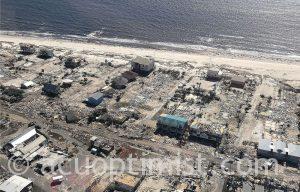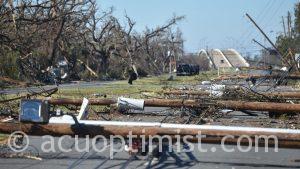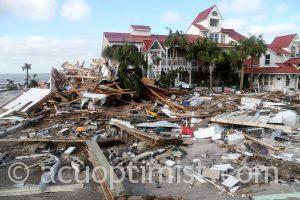
Aerial images depicting damage to homes following Hurricane Michael. Photo by Los Angeles Times (James E Wyatt / EPA/Rex-Shutterstock)
High-speed winds, torrential rain, power outages and fallen trees were only the beginning of the damages Florida faced as Hurricane Michael ravaged the coast. The storm made landfall on Oct. 10 near Mexico Beach, Florida as a Category 4 storm.
At its peak, Hurricane Michael’s winds exceeded 155 mph with a central pressure making it the third-strongest storm to ever hit the U.S., and the single strongest storm to ever hit the Florida panhandle.
The shape of Florida panhandle and its’ low-lying beaches make it extremely vulnerable to hurricanes; specifically rising water and flooding. At 11 a.m., the surge was at six feet, by 2 p.m. it escalated to nine feet before peaking at 14 feet.
Likely the deadliest, most destructive factor, Hurricane Michael’s storm surge was strong enough to move or sink cars, and cover entire homes with dangerous, raging water.
Across the six states affected, over 700,000 people are without power. The current estimated damages exceed $8.1 billion with a toll of over 30 deaths and dozens missing. Rachel Scott, senior EC-6 education major, feels blessed that her family is among the survivors.

Electrical poles collapse block a road in Panama City, Florida. Photo by Hector Retamal/AFP/Getty Images
Scott’s father is in the Air Force, stationed at Fort Walton Beach, Florida. Because he grew up there, this coastal town has felt like home since the family’s return in 2016. Prior to Hurricane Michael, Scott’s family has never had to evacuate due to a hurricane, driving them to make the decision to stay.
Rachel’s family had not yet prepared for the worst when they found out they were in the path of the storm. Because both of her parents work, Scott’s brother went to the local Walmart to get water and canned food.
“It was one of those things that they went to bed and it was just a Category 2 and they woke up and it was a high 4,” Scott said.
While Scott was worried about her family staying during the storm, she found peace knowing what all her family has lived through. While living and serving overseas, the family survived a violent coup. For Scott, this peaked her fear; she allows very little to scare her now.
“You just take a deep breath and remember that a fallen world sucks, but God is still going to be glorified and his heart breaks with us,” said Scott. “Living through trauma gives you peace for the next trauma.”

Damage in Mexico Beach, Florida. Photo by Tampa Bay Times (Douglas R. Clifford)
Scott said she’s spent much of her college career seeing her family live through difficult situations and wishing she could be there.
Scott’s mother works at a Title I school and has several children as students who are homeless. As they prepared for the storm, the Scott family continued to think and worry about the students. They felt helpless as they wondered where they were and if they were safe.
“I find that people are extremely resilient. Your heart hurts, but you keep moving forward,” Scott said. “I hope that as they go through this, they let themselves grieve as well. The people of Florida lost a lot; it’s okay to grieve that.”
As an Air Force chaplain, Scott’s dad is a member of a team that frequently flies into Tyndall Air Force base, which faced extreme damages. Scott said she is grateful for the safety of her family.
“My family was extremely fortunate,” Scott said. “We are reminded that others weren’t. Part of the faith we profess means that we care about others, even when we are not as affected.”
